Get ready for MMIs!
9 Ionawr 2021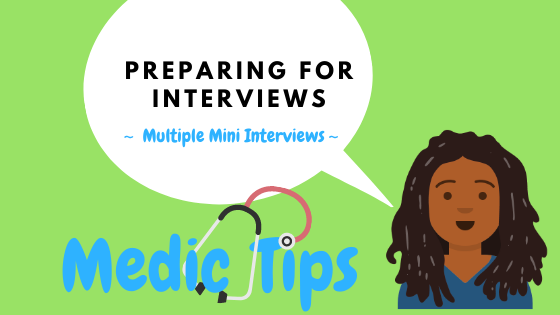
Firstly, if you are reading this with an invite to interview, congratulations! You have overcome the first big hurdle in your journey into medicine! This blog is going to tackle the type of interviews hosted at Cardiff – MMIs with some insight into how they will run virtually, advice for practising and on the day!

So what are MMIs?
Multiple Mini Interviews are a set of strictly timed interview stations that you rotate around which is a great opportnity to demonstrate a variety of skills alongside effective communication.
These are used by the majority of medical schools because you experience a new interviewer for each station which is a huge benefit if one station doesn’t go as well you can make up for it in another! It also helps to eliminate bias as much as possible, as opposed to other types of interviews like panel or 1-to-1 where there is a reliance on limited number of interviews so can be seen to be subjective! You can find the list of all the medical schools who use MMIs here, as well as some great advice.
If you are reading this prior to applying to medicine, it is worthwhile in your research finding out what type of interviews so you know in advance! For other advice about choosing medical schools, please refer back to my previous blog!
I had my interviews in 2018 which was pre-COVID, which meant I experienced in-person interviews! I am going to briefly talk about the format in-person so that you can compare how they are running in 2021 in a virtual format! I have had the opportunity to pilot virtual MMIs which will be running on Zoom so will also draw some insight! I will then explain more in the “How to prepare” section some typical topics and other tips!
Format:
What are they like in-person?
After registration, you will have a period of waiting depending on your slot and a briefing. Then going into the hall, there are approximately 8-10 stations, which include a rest station and also a written station (of maths questions and descriptive task). You have two minutes to read the two questions in the station and then sit down to answer each one with three minutes each. In my experience, there was a large countdown clock on a projector which was useful to keep an eye on time as well as buzzers to indicate when to move on to next question and to move stations.
So how will they look virtually at Cardiff?
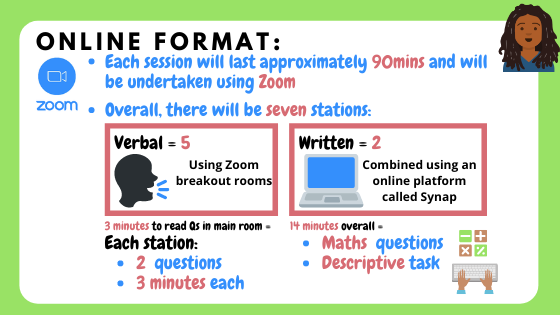
STARTING BRIEFING:
- When you join the Zoom call and all participants have joined, you will have a briefing, whilst the examiners have a briefing in a separate breakout room.
- This briefing will go over the format of the session which has been outlined above and note you will have the verbal stations first and then you will sit the written stations at the same time.
- They will also need to conduct an identity check so please make sure you have your passport or driving licence or ID card to hand. You will be asked to raise this to the camera whilst showing your face as well! I actually found this quite fiddly so perhaps have a go at this beforehand with someone else on a Zoom call!
VERBAL STATIONS: x 5
What is different this time is that ALL of the questions for each station will be displayed on the screen in the main room and you will be instructed which station you will be starting on.
- You may want to quickly skim all the questions at the start to get an overview of what you are expecting, but then following that focus on reading the question for which you are assigned and think about key points you would like to mention.
- You will be automatically moved into breakout room with an examiner who will read out the first question again for you!
- After three minutes, there will be a broadcast message indicating to move onto the next question if you haven’t done so already. The examiner will read out the next question.
- After the next three minutes, you will automatically be moved back to the main room again as you have three minutes inbetween stations (whilst examiners are sent to their breakout rooms). You will be instructed which is your next station for you to focus on reading that question and cycle repeats!
WRITTEN STATIONS: x 2
- You will receive instructions to set up an account on Synap, please make sure you have done this in advance of your interview!
- You will have 14 minutes to complete a paper which will go live in your interview slot on the platform – I would recommend logging in and have a tab open ready so you simply just need to press startwhen you are instructed to do so!
- You will have your webcam on as you do the exam
POST-INTERVIEW BRIEFING:
After you have completed all seven stations, you will have a briefing to explain next steps and an opportunity to give feedback.
- Note that they get thousands of applicants, so once you get to interview stage, you do have a great chance of an offer! These are not official figures, but as an estimate, approximately 1200 students will be interviewed and 50% chance as approximately 600 offers are handed out!
- Your offer is solely based on your interview performance, although from the admissions policy, in certain circumstances of tiebreakers, they may use UCAT to distinguish candidates.
How to prepare:
Firstly, on a technical note, please check out these essential requirements to check you have everything you need! Test everything beforehand and try to find a neutral space for your background!
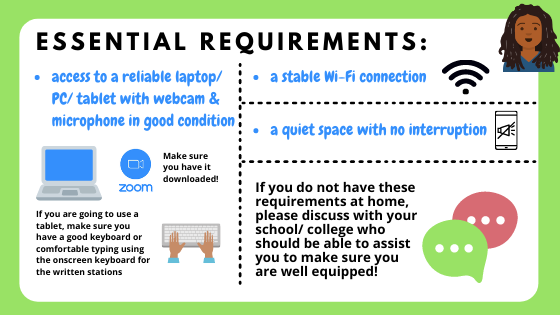
Next, so now you know how they will run, let’s talk about what to expect and how you can prepare for these!
Verbal stations
All stations will be looking at your ability to communicate effectively! It is important that you structure your answers well and try not to waffle. It’s okay if you do not use the full time and you will not get any other questions in the spare time. Sometimes a good technique is to do a summary of your key points. Interestingly, we use this all the time in medicine when we are speaking to patients! We refer to this as signposting as it reminds us what we have said and to see if there is anything else we can add or correct!
I wouldn’t recommend rehearsing set answers but in your preparation, you may want to note down bullet points to help you think of ideas when looking at sample questions!
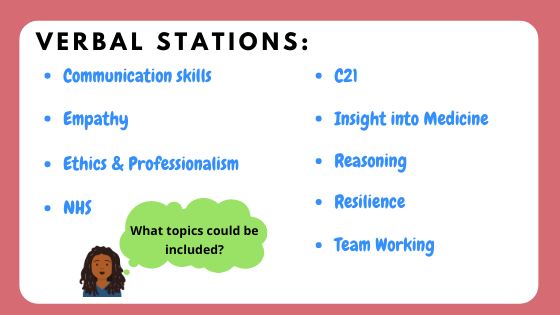
- You will notice some of the topics above are “personal qualities” such as empathy, resilience, team player. This is an opportunity for you to show why you are suitable for the course and to draw examples for you to explore this.
- Hopefully, your personal statement should have covered some of these so I always recommend going back to see what you have written as content for your interviews and to think of scenarios/anecdotes which you can refer back to easily to sell yourself!
- For other personal qualities and values which makes a good doctor/medical student, make sure you have read the resources on NHS, GMC and MSC linked on page 3 & 4 of the medical school’s Thinking about Applying to Medicine booklet!
- These resources will also be useful for ethics & professionalism/ NHS topics. It is good to go over the four pillars of ethics to help you with dilemmas and keep up to date with hot topics in the news!
- Currently, the main hot topic is COVID and vaccinations but previous hot topics to look at could be postcode lottery, Charlie Gard case, NHS budgets and more.
- When looking at these, think of arguments as sometimes you may be asked to provide arguments for and against to demonstrate your reasoning ability as well.
- I would recommend looking through the BBC health page, perhaps have the BBC news app on your phone and scroll through to keep up-to-date leading up to your interview!
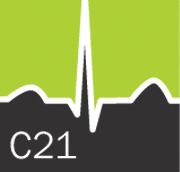
For any medical school, make sure you have done your research about the structure of the course! This has been outlined on the medical school’s website. The curriculum at Cardiff is called C21 which is a spiral curriculum which allows you to build your knowledge year on year.
Other great features of the course are:
- case based learning
- early patient contact
- full body dissection
- opportunities to have placement all over Wales as we are the only undergraduate medical school in Wales – this also includes rural communities
For some further insight, check out my blogs on what’s it like in Year 1 and I will endeavour to add more information about the other years on soon, so keep an eye out on my contents page. In the mean time, don’t hesitate to message me directly for other info!
Written stations
Just a reminder, this will all be on an online platform . You won’t be provided with an online calculator on the platform. You will have free text space to show your working/ give answer. Read the questions carefully!
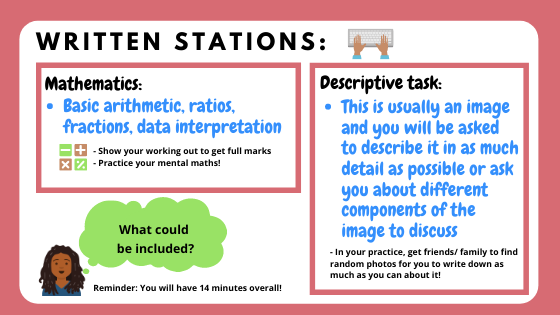
- I always get asked how hard the maths questions are and honestly I did not prepare for this as it is below GCSE level. If you do struggle with mental maths or calculating ratios, fractions, do go over some questions to jog your memory! The number of questions vary but expect beterrn 5-7 I would say!
- It is quite hard to explain the images as every image will be different for each interview slot but the main point of this task is again to demonstrate your ability to break things down and communicate effectively
- As a random example, if you were given an image of an orange, you wouldn’t just write down: “This is an orange”. You would describe the background, the setting, the orientation, the pores, if it looks fresh/ stale, if the colour is consistent throughout, what shade of orange – is it vibrant or dull? etc.
- This is a simple exercise that you can practise by finding random photos and practisie describing them in a timed setting!
FINAL TOP TIPS!
- Practise, practise, practise! Do this on Zoom calls, find sample questions online covering some of the headings spoken about above, use timed conditions and ask your friend/ family/ teacher for feedback!
- Do your research, stay up-to-date, try to gage an insight into medicine and also life in medical schools! There are many Youtubers and bloggers you can follow!
- Dress smartly and professionally, use positive body language, maintain eye contact by keep on looking at the screen/ camera and use gesticulations if that is how you normally speak!
- Be confident and most importantly, be YOU! You have made it this far this is your chance to shine and sell yourself. You are capable of being a medical student – believe in yourself!

I hope this has been useful! Please feel free to leave a comment or contact me via UniBuddy where I am more than happy to answer any other questions you have! Go back to my contents page to find all my other blogs!
- Advice for Students
- After University
- Ail flwyddyn
- Application Process
- Application Process
- Applying to University
- Arian
- Aros gartref
- Aros mewn
- Astudio
- Byw oddi cartref
- Cardiff University Experiences
- Chwaraeon
- Clearing
- Clybiau a chymdeithasau
- Cooking
- Cyd-letywyr
- Cymraeg
- Darlithoedd
- Dim ond yng Nghaerdydd
- Exams
- Global Opportunities
- Guest posts
- Heb ei gategoreiddio
- Medic Tips
- Mynd allan
- Neuaddau Preswyl
- Open Day
- Opportunities
- Postgraduate Study
- Rhentu tŷ
- Student Heroes
- Student Life
- Studying Online
- Swyddi a phrofiad gwaith
- Teithio
- Things to do in Cardiff
- Top Tips
- Trydedd flwyddyn
- UCAS Application
- Why University?
- Ymgartrefu